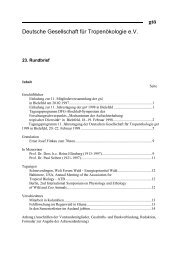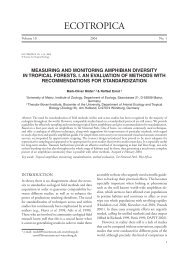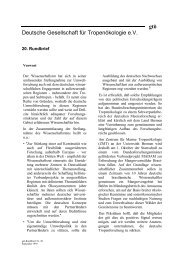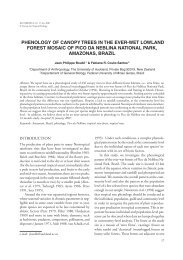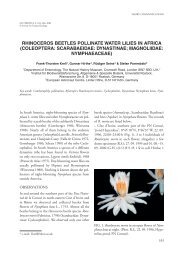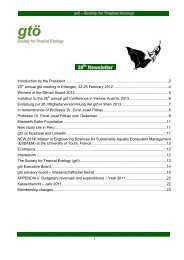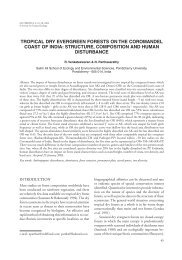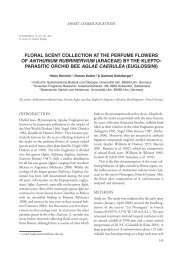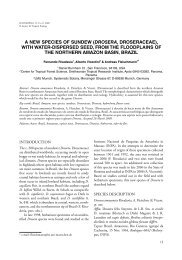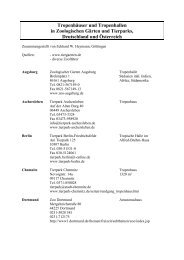Abstract booklet - gtö – Society for Tropical Ecology
Abstract booklet - gtö – Society for Tropical Ecology
Abstract booklet - gtö – Society for Tropical Ecology
You also want an ePaper? Increase the reach of your titles
YUMPU automatically turns print PDFs into web optimized ePapers that Google loves.
32 PARALLEL SESSION HALL H III: THE ANDEAN BIODIVERSITY HOTSPOTPARALLEL SESSION HALL H III: THE ANDEAN BIODIVERSITY HOTSPOT 33MONDAY 17:30 Hall H IIIDECOMPOSITION RATES AND MICROARTHROPOD COLONIZATIONOF LEAVES AND ROOTSIN TROPICAL MONTANE RAIN FORESTS ALONG AN ALTITUDINALGRADIENT IN SOUTHERN ECUADORFranca Marian 11Uni Göttingen, Inst. f. Zoo, Göttingen, not U, DE, fmarian@gwdg.deThe effect of altitude and litter type on decomposition rates and microarthropodcolonisation in a tropical montane rain <strong>for</strong>est in southern Ecuador wasinvestigated. Leaf litter from three tree species and roots of different diameterswere collected from three sites along an altitudinal gradient (1000, 2000, 3000m). Litter and roots were placed in litterbags in the field, and after six and twelvemonths the C/N ratio, microbial biomass, colonisation by microarthropods andremaining dry mass were determined. Microbial parameters were correlatedwith litter quality which declined with the altitude of its origin. The densityof microarthropods correlated poorly with litter origin and quality. This wasalso true <strong>for</strong> the relationship between microarthropods and microorganisms.The density of microarthropods declined with altitude, suggesting that theywere driven by site-specific conditions. Altitude was the main factor modifyingdecomposition rates. Processes related to decomposition were faster at loweraltitudes. The origin of the litter and there<strong>for</strong>e its quality did not significantlyaffect decomposition processes, and microbial biomass correlated poorly withdecomposition rates.DENSITY AND COMMUNITY STRUCTURE OF SOIL- AND BARK-LIVING MICROARTHROPODS ALONG AN ALTITUDINAL GRADIENTIN A TROPICAL MONTANE RAINFORESTMark Maraun 11University of Goettingen, Goettingen, DE, mmaraun@gwdg.deMicroarthropod communities in the soil and on the bark of trees wereinvestigated along an elevation gradient (1850, 2000, 2150, 2300 m) in a tropicalmontane rain <strong>for</strong>est in southern Ecuador. We hypothesised that the densityof microarthropods declines with depth in soil and increases with increasingaltitude mainly due to the availability of resources, i.e. organic matter. Inaddition, we expected bark and soil communities to differ strongly, since thebark of trees is more exposed to harsher factors. In contrast to our hypothesis,the density of major microarthropod groups (Collembola, Oribatida, Gamasina,Uropodina) was generally low and decreased with altitude. However, as wepredicted the density of each of the groups decreased with soil depth. Densityof microarthropods on tree bark was lower than in soil. Overall, 43 species o<strong>for</strong>ibatid mites were found, with the most abundant higher taxa being Poronota,pycnonotic Apheredermata, Mixonomata and Eupheredermata. The oribatidmite community on bark did not differ significantly from that in soil. The numberof oribatid mite species declined with altitude (24, 23, 17 and 13 species at 1850,2000, 2150 and 2300 m, respectively). Rarefaction curves indicate that overallabout 50 oribatid mite species are to be expected along the studied altitudinalgradient. Results of this study indicate (1) that microarthropods may be limitedby the quality of resources at high altitudes and by the amount of resourcesat deeper soil layers, and (2) that the bark of trees and the soil are habitats ofsimilar quality <strong>for</strong> oribatid mites.MONDAY 17:45 Hall H IIIgtö<strong>Society</strong> <strong>for</strong> <strong>Tropical</strong> <strong>Ecology</strong> | Gesellschaft für Tropenökologie e.V. Status and future of tropical biodiversity | Frankfurt, 21 - 24 February 2011gtö



